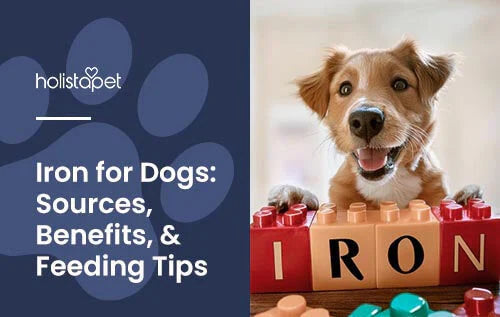Is your once energetic pup snoozing more these days? It might surprise you to know that a lack of iron for dogs could be the culprit. Iron is an essential mineral that fuels your furry friend. It helps make red blood cells, which carry oxygen throughout your dog's body. This oxygen gives them the energy they need to run, play fetch, and cuddle.
Without enough iron, your dog might feel drained. They might even get seriously sick. But don't worry. There are ways to give your canine companion more iron. Keep reading to find out how.
What Is Iron and What Does It Do?
Iron is like a building block for your dog's health. This essential mineral helps produce hemoglobin, a key protein in red blood cells. Hemoglobin acts like a tiny carrier, transporting oxygen from the lungs throughout the body. Without iron, your pet's cells can't get the oxygen they need to function properly.
That's not all. Iron helps in other ways, too, like giving dogs energy to play and supporting their immune system to fight off sickness. In short, iron is a cornerstone of canine wellness.
What Are the Health Benefits of Iron for Dogs?
So, how exactly does iron make dogs feel so energetic and healthy? Let's discuss how this vital nutrient can do wonders for canines:
- Helps Create Red Blood Cells. Remember how iron helps make hemoglobin? Hemoglobin is an important part of red blood cells that helps move oxygen throughout the body.
- Aids Oxygen Transport. Iron binds to oxygen in the lungs and helps deliver it everywhere it needs to go. It makes sure every part of your dog's body gets the oxygen it needs to function well.
- Supports Energy Production. Iron supports metabolic processes that turn food into energy. It gives your pup the power boost they need to play and zoom around.
- Supports the Immune System. Iron also supports the production of immune cells. These cells help fight off infections and speed up recovery.
- Promotes Growth and Development. The body needs iron to create DNA and other genetic materials. The mineral is a must for growing puppies so that their tissues and organs develop properly.
What Is Iron Deficiency in Dogs?
Sometimes, dogs don't get enough iron in their diet. This shortage can lead to iron deficiency anemia in dogs. This basically means the body is not making enough red blood cells.
Anemic dogs can experience tiredness, weakness, and overall lethargy. A poor diet, chronic blood loss, or health issues like gastrointestinal tumors and kidney disease can affect a dog's iron levels and cause iron deficiency.
Symptoms and Treatment of Iron Deficiency in Dogs
Dogs with iron deficiency will show some pretty obvious symptoms. Here are some common signs:
- Lethargy and Weakness
- Pale Gums
- Rapid Breathing or Shortness of Breath
- Decreased Appetite
- Weight Loss
The good news is that vets can diagnose and treat iron deficiencies. If you notice any of these symptoms, visit your vet for a proper diagnosis. They may suggest updating your dog's diet to start. They may also recommend iron supplements to increase your furry pal's iron intake.

How Can I Make Sure My Dog Has Enough Iron?
Iron deficiency sure doesn't sound fun. That's why keeping your dog's iron levels in check is important. There are three routes you can take:
- Iron-Rich Foods for Dogs
- Iron Supplements for Dogs
- Parasite Prevention
Iron-Rich Foods for Dogs
You can't go wrong with improving your dog's diet. Add these iron-rich foods to your pup's meals if they need an iron boost:
- Red Meats. Beef, lamb, and pork have excellent iron content. They are also rich in protein.
- Organ Meats. Beef liver, chicken liver, and kidneys are high in iron and other essential nutrients.
- Eggs. Eggs are a good source of easily digestible iron.
- Green Vegetables. Spinach, kale, and broccoli provide plant-based iron. They may not be as rich in iron as meats but offer additional vitamins and minerals.
Iron Supplements for Dogs
Sometimes, even with a great diet, your dog might still need some help. This is where iron supplements come in. These products can help boost your pup's iron levels:
- Treats and Chews. Dogs love these because they're fun snacks. Look no further than HolistaPet's Multivitamin Soft Chews for Dogs for a quality product. They contain iron, plus other beneficial nutrients like vitamin C, calcium, magnesium, and more.
- Tablets. These give your dog an exact dose. You can give tablets directly (if your dog's okay with it) or hide them in food or treats.
- Powders. Powder supplements are simple to mix with your pet's food. It's a fuss-free way to add more iron to their meals.
- Injections. In serious situations, vets might use iron injections. These are a quick and effective way to treat severe iron deficiency anemia.
Parasite Prevention
Pesky parasites like fleas, ticks, and worms can steal your dog's iron by causing chronic blood loss and nutrient deficiencies. Regular deworming treatments can get rid of these unwanted hitchhikers. Monthly anti-tick and flea medications can also act as additional safety measures.
Keeping a clean environment and regularly grooming your pup also drive off parasites. And don't forget those checkups so your vet can catch any problems early on, including icky infestations.
How Much Iron Do Dogs Need Daily?
How much iron a dog needs depends on their size, age, and health. Generally, canines need around 0.5 milligrams of iron per kilogram of body weight. However, puppies and pregnant or nursing moms might need more.
The best approach is to talk to your vet. They can consider your dog's health conditions or dietary restrictions and recommend the perfect dose.
Related Post: Biotin for Dogs 101
Can Dogs Have Too Much Iron?
Yes, dogs can have too much iron, which can cause iron toxicity or overdose. This happens when there's excessive iron in their system. Maybe they accidentally ate iron-rich foods or took iron supplements without your supervision.
How can you avoid this situation? Keep iron supplements and iron-rich foods out of your dog's reach. If you think your pup might have overdosed, call your vet, stat.
Dangers of Iron Overdose in Dogs
Iron overdose can be serious for dogs, even life-threatening. If your pet takes too much iron, their tummy, liver, and other important organs can get damaged. Here are some signs to watch out for:
- Vomiting and Diarrhea, Often With Blood
- Abdominal Pain and Swelling
- Lethargy and Weakness
- Rapid Heart Rate and Low Blood Pressure
- Seizures or Tremors in Severe Cases
If you think your dog overdosed on iron, take them to the vet right away. The vet might induce vomiting, administer activated charcoal, or provide IV fluids to help your dog recover. Remember, early treatment can help prevent lasting damage.
How Can I Monitor My Dog's Iron Levels?
There's no better way to monitor your dog's iron levels than through regular checkups. Your vet can perform blood tests and give you a clear picture of your pup's health.
But you can also help at home. Watch your dog for any signs of iron deficiency or overdose. Also, make sure they finish their meals and take their vet-approved supplements. By teaming up with your vet, you can contribute to your furry friend's better health.
Final Thoughts on Iron for Dogs
It's safe to say — iron is an absolute must for dogs. This essential vitamin can be key to keeping your pup beaming with energy and good health all day, every day.
Follow our tips for boosting your pup's iron intake through healthy foods or quality supplements like our Multivitamin Soft Chews for Dogs. With the right care and nutrition, you can watch your best friend live their best life.







![Probiotics For Dogs [Soft Chews] - HolistaPet](http://www.holistapet.com/cdn/shop/files/Probiotic-Infographic-1_472d7a29-e30c-435a-9638-1365d8c3a9f9.jpg?v=1725384841&width=104)




























Leave a comment
All comments are moderated before being published.
This site is protected by hCaptcha and the hCaptcha Privacy Policy and Terms of Service apply.